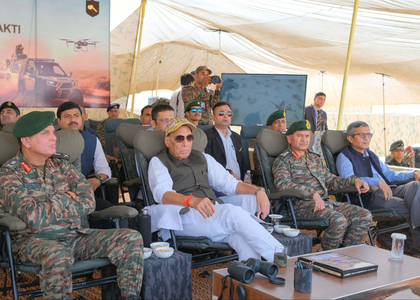Op Sindoor embodiment of India’s military prowess: Rajnath Singh
By IANS | Updated: October 24, 2025 22:30 IST2025-10-24T22:27:51+5:302025-10-24T22:30:11+5:30
Jaipur, Oct 24 Defence Minister Rajnath Singh took stock of the security situation and the operational preparedness of ...

Op Sindoor embodiment of India’s military prowess: Rajnath Singh
Jaipur, Oct 24 Defence Minister Rajnath Singh took stock of the security situation and the operational preparedness of the Indian Army during the Army Commanders’ Conference in Jaisalmer, and the visit to the forward areas of Tanot and Laungewala in Rajasthan on Friday.
During the conference, detailed deliberations were held with the senior leadership of the Indian Army on key aspects, including Grey Zone Warfare and the roadmap for Jointness, Aatmanirbharta and Innovation.
Chief of Defence Staff General Anil Chauhan, Chief of the Army Staff General Upendra Dwivedi, Defence Secretary Rajesh Kumar Singh, Vice Chief of the Army Staff Lieutenant General Pushpendra Singh and all Army Commanders were in attendance.
In his address, Raksha Mantri described Operation Sindoor as an embodiment of India’s military prowess & national character, and a demonstration by the soldiers that their strength lies not only in weapons but also in their ethical discipline & strategic clarity.
“Operation Sindoor will go down in history as not just a military operation, but also a symbol of the nation’s courage and restraint. The action taken by our forces against terrorists was in keeping with both policy precision and human dignity. The operation isn’t over. Our mission for peace will continue as long as even a single terrorist mindset remains alive,” he said.
Rajnath Singh underlined that Operation Sindoor has given rise to a new strategic thinking that India responds to any terrorist activity on its own terms.
“This is New India’s Defence Doctrine, which embodies both resolve and courage,” he said.
While Raksha Mantri expressed gratitude to the soldiers for standing guard 24X7 to protect the nation’s integrity, he exhorted them to never underestimate the adversaries and remain alert & ready always.
Raksha Mantri urged the commanders to continue focusing on defence diplomacy, Aatmanirbharta, Information Warfare, Defence Infrastructure, and Force Modernisation to ensure a Future-Ready Army.
He hailed the professionalism, courage, and resilience of the Indian Armed Forces and reaffirmed the government’s unwavering commitment to provide state-of-the-art technology, infrastructure, and support to maintain the highest levels of operational preparedness.
He praised the significant role of the Indian Army in ensuring peace and development in Jammu & Kashmir following the abrogation of Article 370.
“The abrogation of Article 370 was historic. Today, the streets there are filled with hope, and not unrest. People are confident about their future. Most importantly, the decision-making system is now in the hands of the local people. The Indian Army has played a crucial role in this endeavour,” he said.
On the situation along the Northern border, Raksha Mantri stated that the ongoing talks and de-escalation steps have demonstrated a balanced and firm foreign policy of India.
“Our policy is clear that there will be dialogue, and our readiness on the border will remain intact,” he said.
Appreciating the willpower and discipline of the soldiers, Rajnath Singh termed it as a testimony to the fact that the Indian military is considered one of the most adaptable forces in the world.
“Whether it’s the freezing icy terrain of Siachen, or the scorching heat of the Rajasthan desert, or counter-insurgency operations in the dense forests, our soldiers have always demonstrated their capability and commitment. Despite the tough conditions and diverse challenges, they adapt to the changes and further strengthen national security,” he said.
Raksha Mantri emphasised that while present-day warfare is technology-driven, the soldiers remain the greatest assets of the country. He stated that machines multiply strength, but it’s the human spirit that possesses the power to deliver results.
He asserted that modern-day warfare is fought in invisible domains such as cyberspace, information, electronic disruption, and space control, and what matters, along with adapting to the latest technological advancements, is quick decision-making and the willpower of the soldiers.
As part of the conference, Rajnath Singh also carried out the virtual inauguration of Technology Enablers, including the Edge Data Centres of Konark and Fire & Fury Corps of the Indian Army.
He also inaugurated Naman Centres for the facilitation of the veterans and Next-of-Kin. At Laungewala, Raksha Mantri laid a wreath at the iconic Laungewala Yudh Sthal and paid homage to the bravehearts of the Indian Army.
Rajnath Singh inaugurated ‘Chandpuri Hall’, an Audio-Visual Room, dedicated to the memory of Major (later Brigadier) Kuldip Singh Chandpuri, who led the gallant defence during the Battle of Laungewala in 1971.
He also felicitated the veterans who had participated in the battle.
He also reviewed the multitude of infrastructure projects being undertaken for developing the historical site as an icon of national pride, showcasing the valour and resilience of the Indian Army.
Rajnath Singh also witnessed a dynamic ‘Capability Demonstration Exercise’, showcasing integrated employment of new organisations such as the Bhairav Battalion and Ashni Platoon, along with the latest technological assets inducted into the Indian Army for the conduct of operations.
The display symbolised the seamless blend of legacy and innovation, highlighting the Indian Army’s thrust on Capability Development and Force Modernisation.
--IANS
arc/dan
Disclaimer: This post has been auto-published from an agency feed without any modifications to the text and has not been reviewed by an editor
Open in app